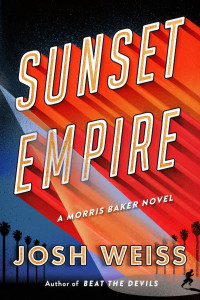 Josh Weiss’s Sunset Empire is a sequel to his Beat the Devils. Both are pieces of alternate history set in a strange world where Joe McCarthy managed to be elected president. The Korean War continues through the end of 1959, and the story once again follows Morris Baker in an investigation.
Josh Weiss’s Sunset Empire is a sequel to his Beat the Devils. Both are pieces of alternate history set in a strange world where Joe McCarthy managed to be elected president. The Korean War continues through the end of 1959, and the story once again follows Morris Baker in an investigation.
That last fact, and the changes to the real world that would have required it, are rather key to the understanding of this book. The similarities between these books and the Trump presidency, and modern Republicans in general are obvious. Indeed the version of Joe McCarthy in these books, while much less vile and more intelligent than the real man, still comes across as a more likable character than almost any elected official in the right in American politics today. Extremism oriented politics, waves of deliberately fanned racial hatred and a government working hard to hurt those in need will all feel stunningly familiar.
In many ways this book could be said to have no true narrative ending. The final pages and chapters bring the current mystery to a close, it’s true, but they leave such an over-the-top plot thread hanging as to make it almost worthless. A scene of brutal grotesquery and bloodshed, it is clearly intended to engender further chapters in the story, but it also serves the unfortunate purpose of escaping the connections to reality that helped to anchor this book. Nazis are introduced in the background of the setting, reinforcing ideas of mind control throughout the text as well as suggesting a great influence on the American government. While interesting ideas, this separates it from being an alternate world where the bad comes from within into something that is caused by evil interlopers. How much one will appreciate that is greatly open to interpretation.
In alternate history, bleak timelines are not only common but expected by publishers and audiences alike. While this is in many ways a timeline that would result from a Joseph McCarthy presidency, the continued usage of “everything goes wrong and anyone good will fail” is only going to alienate some readers. Weiss’s repeated references to the real world, through the names of people who were important then if nothing else, attempt to serve as repeated reminders of how this is supposed to have deviated from the real world. None of these are bad as such, the use of existing historical figures is bread and butter for the genre; however, the ways they connect might be unbelievable at best for many. It is not the premise, even for fans of alternate history or mysteries, but the talents of Josh Weiss that will keep readers interested.
Fans of the first book will likely find this an easy read. New readers picking it up are likely to understand most of it pretty quickly, due in no small part to their understanding of the concept of alternate history. Josh Weiss continues to be able to move a story fast, and use plenty of the basic tools of a thriller to good effect. Historians might and indeed are likely to quibble with various facts of the setting, buy the relative rarity of an alternate 1950 setting for alternate history compared to World War II or the Civil War will be pleasing to many. Interested parties should give it a look.
(Grand Central Publishing, 2023)
